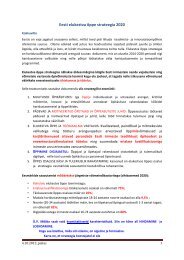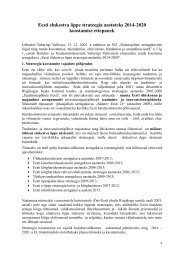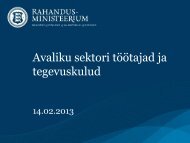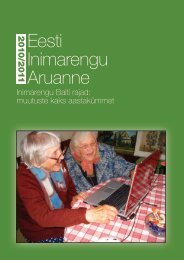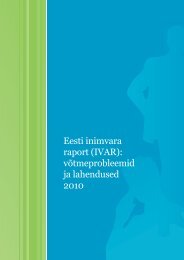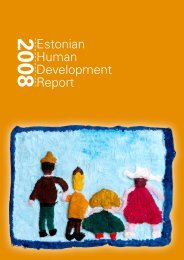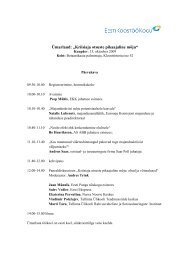DEVELOPMENT
The pdf-version - Eesti Koostöö Kogu
The pdf-version - Eesti Koostöö Kogu
Create successful ePaper yourself
Turn your PDF publications into a flip-book with our unique Google optimized e-Paper software.
Figure 2.8.2<br />
Trust in the parliament and government, from 2000 to 2012<br />
Government<br />
Parliament<br />
65<br />
65<br />
60<br />
60<br />
55<br />
55<br />
50<br />
50<br />
45<br />
45<br />
Trust, percentage<br />
40<br />
35<br />
30<br />
40<br />
35<br />
30<br />
May 2000<br />
Oct 2000<br />
May 2001<br />
Oct 2001<br />
June 2002<br />
Oct 2002<br />
June 2003<br />
Oct 2003<br />
June 2004<br />
Oct 2004<br />
June 2005<br />
Oct 20 05<br />
Sept 2006<br />
Dec 2006<br />
June 2007<br />
Sept 2007<br />
Jan 2008<br />
Aug 2008<br />
Jan 2009<br />
May 2009<br />
Jan 2010<br />
Sept 2010<br />
Oct 20 11<br />
Mar 2012<br />
Oct 2012<br />
Source: Public Opinion and National Defence poll<br />
citizens do. In Lithuania, Latvia, Slovenia and the Czech<br />
Republic, only one in nine citizens trusts the parliament.<br />
Therefore, in Estonia, trust in both the government and the<br />
parliament is the highest of all the new EU Member States.<br />
This picture can probably be explained by the existence<br />
of different political cultures, including the understanding<br />
of people living in the developed democracies<br />
that, regardless of the current difficulties that negatively<br />
impact the development of the state, the parliament and<br />
government are doing their best, and their actions are<br />
based on the interests of the people. However, in the<br />
Central and Eastern European states, thanks to extensive<br />
political alienation, distrust in political institutions predominates.<br />
Understandably, the trustworthiness of political institutions<br />
is affected not only by the acuteness of the societal<br />
problems, but also by specific political circumstances and<br />
election cycles. It is quite usual that, after general elections,<br />
the trust in the newly elected parliament, and the government<br />
formed thereby, is high. However, during the term<br />
of office, this trust starts to decrease.<br />
An example is the level of trust in the parliament<br />
and government, based on the monitoring of public opinion<br />
by the Public Opinion and National Defence Survey,<br />
between 2000 and 2012 (Figure 2.8.2). We can also see<br />
that, in addition to the election cycle, the trust ratings are<br />
also strongly impacted by the economic situation – the<br />
impact of the 2008 economic recession was revealed in<br />
the declining trust assessments. The recovery from the<br />
crisis was marked by a sharp increase in trust, which,<br />
however, turned into a steady decline, at the end of 2011.<br />
From the graph, we can see that the rise and fall of<br />
the trust in political authority is related to the election<br />
cycles, as well as to large political crises and scandals<br />
(2001 – Laar’s picture scandal; 2004 – fall of the Res<br />
Publica government; 2007 – Bronze Night, which lead to<br />
Figure 2.8.3<br />
Trust of the Estonians and the Russian-speaking minority<br />
toward the parliament and government, from 2006 to 2012<br />
Parliament:<br />
Parliament:<br />
Trust, percentage<br />
75<br />
70<br />
65<br />
60<br />
55<br />
50<br />
45<br />
40<br />
35<br />
30<br />
25<br />
20<br />
15<br />
10<br />
5<br />
0<br />
Dec 2006<br />
June 2007<br />
Jan 2008<br />
Estonians<br />
Estonians<br />
Aug 2008<br />
Jan 2009<br />
May 2009<br />
non-Estonians<br />
non-Estonians<br />
Jan 2010<br />
Sept 2010<br />
Aug 2011<br />
Source: Public Opinion and National Defence poll<br />
Oct 2011<br />
Mar 2012<br />
Oct 2012<br />
75<br />
70<br />
65<br />
60<br />
55<br />
50<br />
45<br />
40<br />
35<br />
30<br />
25<br />
20<br />
15<br />
10<br />
5<br />
0<br />
96<br />
Estonian Human Development Report 2012/2013



